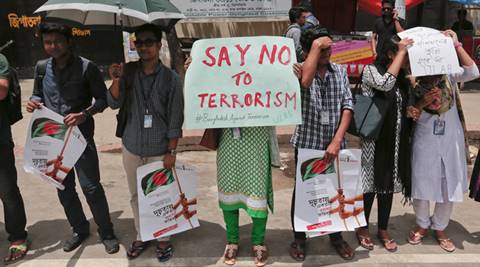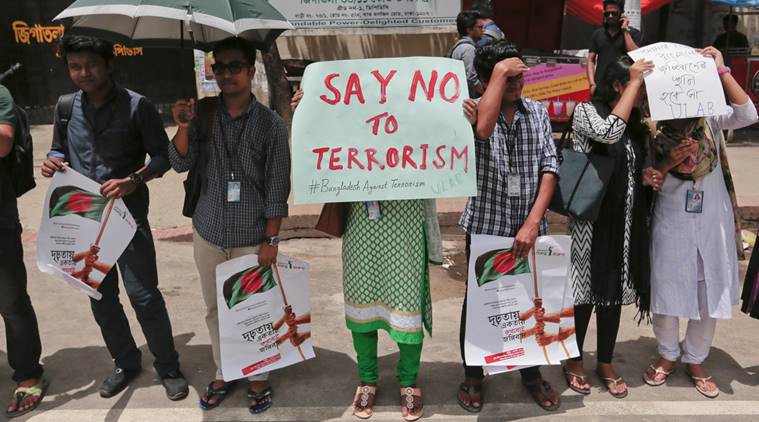Opinion View From The Right: Praising Bangladesh
The ISI had always recruited jihadis from Bangladesh “who are facilitating radicalisation and anti-Bharat feelings in the eastern neighbourhood”.
 Bangladeshi students and teachers hold placards and form a human chain to protest against terrorism in Dhaka, Bangladesh, Monday, Aug. 1, 2016. The students from hundreds of colleges and universities in Dhaka and other cities took part in the protest Monday as part of a campaign to create awareness about the rise of Islamic extremism in the country. (AP Photo)
Bangladeshi students and teachers hold placards and form a human chain to protest against terrorism in Dhaka, Bangladesh, Monday, Aug. 1, 2016. The students from hundreds of colleges and universities in Dhaka and other cities took part in the protest Monday as part of a campaign to create awareness about the rise of Islamic extremism in the country. (AP Photo)  Within a month of the terror attack in Dhaka, Bangladesh killed nine Islamic extremists, it notes.
Within a month of the terror attack in Dhaka, Bangladesh killed nine Islamic extremists, it notes.
Compiled by Ashutosh Bhardwaj
The editorial in Organiser compares the state of affairs in Pakistan and Bangladesh and their responses to terrorism. “When Pakistan was still mourning over killing of a terrorist [Burhan Wani],” Bangladesh Prime Minister “pronounced (her) resolve for eliminating terrorists from their roots”. Within a month of the terror attack in Dhaka, Bangladesh killed nine Islamic extremists, it notes. “Though general perception in Bharat about both neighbours is the same, the ground realities are different in three fundamental ways,” it says.
“It is true that minority rights and growing radicalisation are serious concerns for Bangladesh,” but “we cannot comprehend it without bringing Pakistan into picture”.
The ISI had always recruited jihadis from Bangladesh “who are facilitating radicalisation and anti-Bharat feelings in the eastern neighbourhood”. It quotes Baloch nationalist leader Sardar Ataullah Mengal that “The Two Nation Theory drowned in the Bay of Bengal in 1971”. “If the very existential basis of Pakistan is anti-Bharat, the starting point of emergence of Bangladesh was not to be part of such Pakistan,” it says.
The difference in ideological foundations reflects in the counter-terrorism policies of the two countries. Despite gaining the “international tag of being a fountainhead of terrorism”, “Pakistan is still in self-congratulatory mode on the creation of demons like Hafiz Saeed”. Whereas, “the sustained and systematic approach of Bangladesh in countering terrorism is visible”.
Irom’s Silence
An article in the Organiser comments on Irom Sharmila’s decision to withdraw her hunger strike and contest elections. She has been on hunger strike for the last 16 years, after 10 persons were killed by Assam Rifles troops near a bus stop at Malom in the outskirts of Imphal.
It says that while she criticised the role of the army in Manipur, she has remained silent even as “over a hundred Hindi speaking people and others have been killed”. It says, “on almost every disturbance, innocent Hindi speaking people, including women and children are hounded and herded”. “Their human rights and civil liberties are curtailed,” it says, adding that “Sharmila never spoke for them.”
“Security forces are ambushed and killed. The wives of security personnel are widowed and children orphaned,” but Sharmila “has maintained silence on it too”.
She has been silent on the hounding of prominent businessmen who came to live in Manipur from across the country, and were forced to leave the state. The article quotes a “prominent senior citizen from Imphal” who claims “human rights for Manipur people are hijacked by the armed militants, but Sharmila never talked about it.”
She has now decided to contest assembly polls and intends “to lead a normal life that includes marriage to her boyfriend” who is “a British Indian of Goan origin”. It asks whether this is “just a change of strategy or disillusionment that led to preference to personal life” .
Nepal’s Crisis
The editorial in Panchjanya comments on the unfolding crisis in Nepal. Though the latest crisis emerges from the resignation of Prime Minister K.P. Oli, the uncertainty is “nothing new”. The political class has failed to meet expectations.
The conflicting interests of these politicians have “staked the peace and stability of Nepal”. “If on one hand are the people’s desires linked with the natural cultural bonds with India, on the other hand are political agendas tied with the Chinese establishment,” it says.
Leftist politics has created regional disturbances in the country by dividing its “population into Madheshi and Gorkh,” and creating an arbitrary distance with India. “For India, the biggest question today is not about whether it is Oli or Prachanda,” it says, and notes that “the question is that irrespective of whosoever among the two remains, what would be the intention and approach of Nepalese politics towards India.” Oli had clear preference for China, which was witnessed during the Madheshi movement. Prachanda’s perspective towards China and Maoism is also quite clear.
In such a scenario, the incorporation of the aspirations of Nepal’s common people into its politics is a major challenge.




